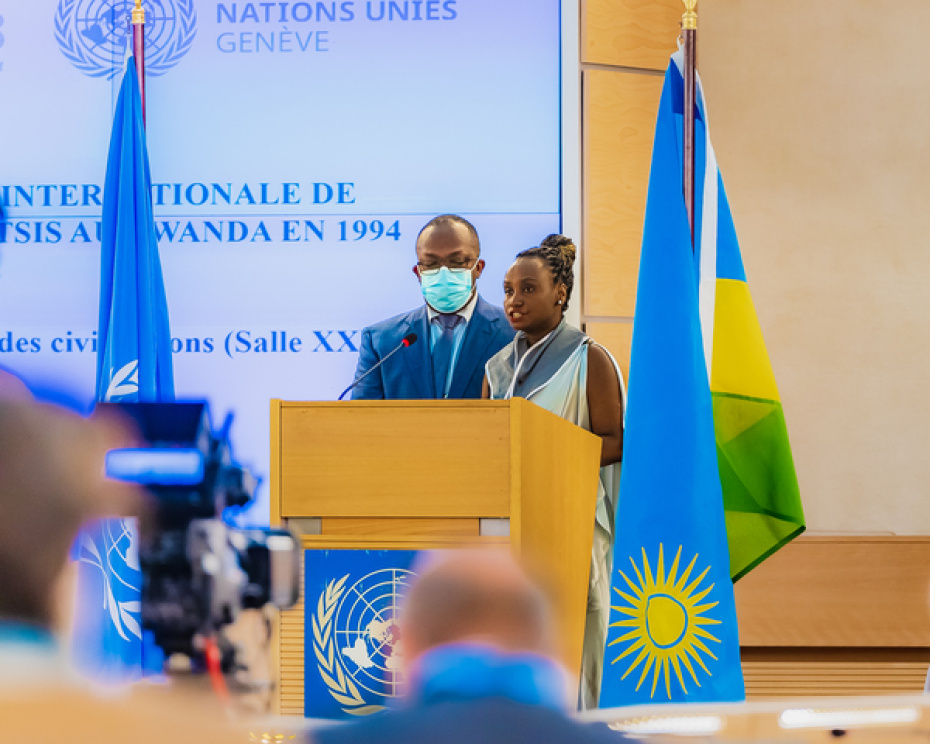Breadcrumb

Emerging from the darkest depths: UN Geneva remembers victims of 1994 genocide in Rwanda

Born in 1983, in the Gasabo District in Kigali, Judence Kayitsei was a mere 11 years old when the killings began.
Over the 100 days in 1994 that saw an estimated 800,000 people, mostly Tutsi, massacred in Rwanda, she lost her parents and many of her relatives.
She herself was badly injured by militias Interhamwe, who hit her on the head with a machete. She was not expected to survive, and only regained her speech four years after the end of the genocide.
Ms. Kayitsei gave a moving account of her life before, during, and after the horrendous events that happened 28 years ago during today’s ceremony at the United Nations in Geneva to pay tribute to the victims and honor survivors.
Justice delayed is justice denied
After candles were lit and Daniela Gasana sang a song in memory of the victims, Ambassador Marie Chantal Rwakazina called on the international community to step up their efforts to put in place laws condemning genocide and to eradicate the culture of impunity.
“Genocide is a crime against humanity,” said Rwanda’s Permanent Representative to the United Nations in Geneva. “Members of the international community have the collective obligation to take measures to prevent and punish the crime of genocide, including by enacting existing legislation and punishing perpetrators.”
Ms. Rwakazina urged countries with outstanding arrest warrants to act on them. “Justice delayed is justice denied,” she said. “Timely justice is one of the ways to honor the victims of genocide against the Tutsi.”
Today is the International Day of Reflection on the Genocide of the Tutsi at #Rwanda 🇷🇼 in 1994.
— UN Geneva (@UNGeneva) April 7, 2022
On the occasion, @UNGeneva with @RwandaInGeneva and @ibukasuise commemorated the death of nearly one million people 28 years ago. #Kwibuka28 pic.twitter.com/5ADBJm6rh6
A great test before us
In a statement read out during the ceremony, UN Secretary General António Guterres drew parallels between the past and present, saying that today there is a great test before us.
“Today Ukraine is in flames, and old and new conflicts fester in the Middle East, Africa and beyond… wars are raging, inequalities widening, and poverty growing, and all are breeding grounds of resentment, anxiety and anger.”
“Rwanda today stands as a powerful testament of the human spirit to heal even the deepest wound and emerge from the darkest depths to build a society,” said Mr Guterres.
“As we look back with remorse, let us look ahead with resolve. Let us commit to be ever vigilant, and never forget. And let us pay meaningful tribute to the Rwandans who perished by building a future of dignity, tolerance and human rights for all.”
A broken life
When the RPF-Inkotanyi soldiers finally liberated Kigali, Ms. Kayitsei was rescued and taken to an orphanage in Kimihurura.
After a few months, family members who had survived the genocide, took her in, and they started a new life together.
Now living in Germany with her husband and three children, she wrote the book “A Broken Life”, for her children, surviving family members, and others so they would know what happened in Rwanda.
“Twenty-eight years after the genocide against the Tutsi, I want to tell you we are alive now and have hope for the future … even though it has been a difficult journey. Keeping the memory of our beloved ones was an act of empathy, our choice to listen to the survivors of the 1994 genocide in Rwanda.”
